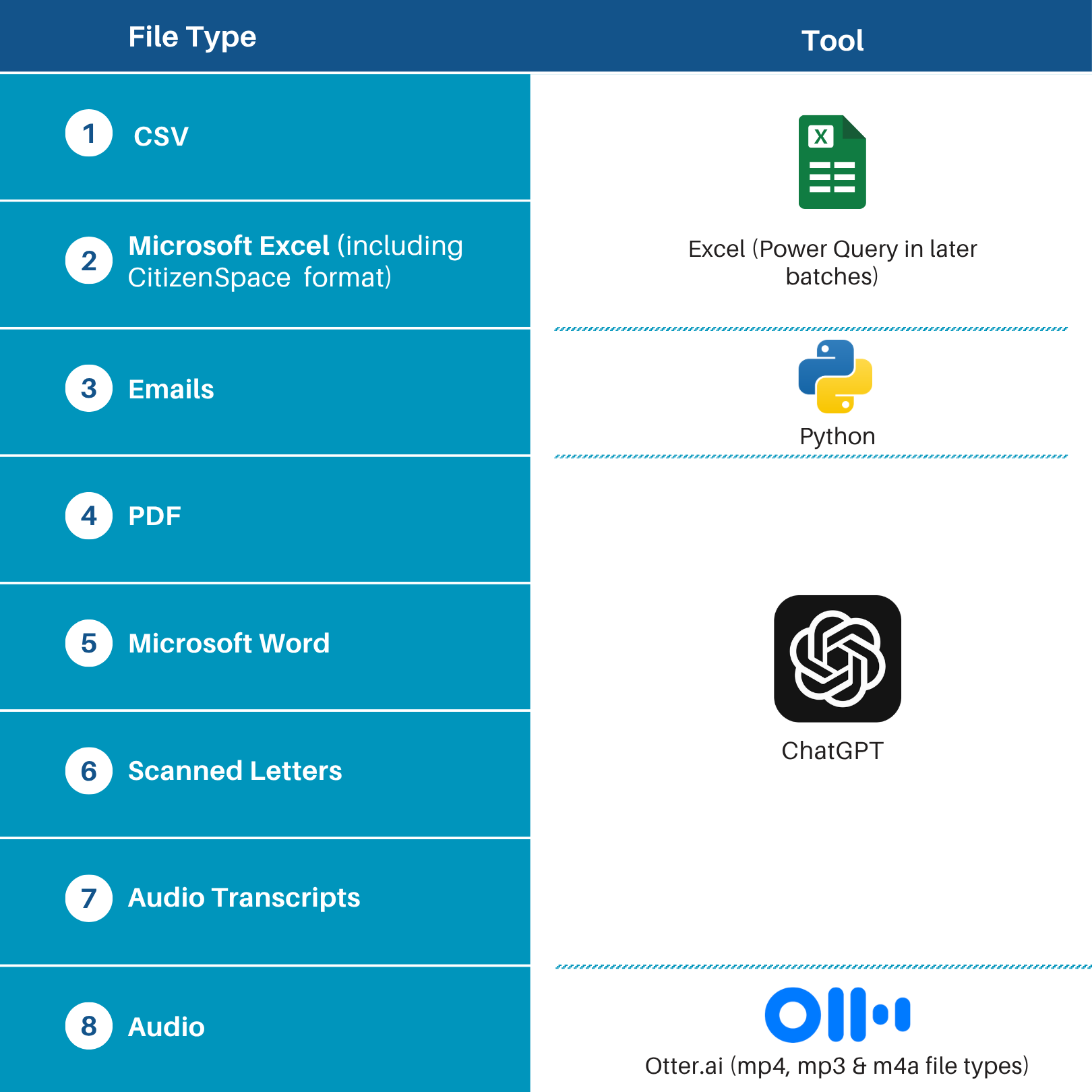Consultation analysis is an essential part of how governments and regulators gather and interpret evidence for policy decisions. MCC Economics supports this process by analysing public and stakeholder submissions at speed, with accuracy, independence, and rigour. Our work helps departments identify the substance of stakeholder views, assess the strength of supporting evidence, and ensure that responses are represented objectively. Each project is delivered with full auditability, so findings can be defended under scrutiny.
We analyse consultations of all sizes - from targeted calls for evidence to large-scale exercises with tens of thousands of submissions.
Our framework draws on experience from multiple government assignments and uses structured methods to review, categorise, and synthesise responses.
We apply both quantitative and qualitative analysis to surface trends, points of consensus, and areas of contention, ensuring that the evidence base is clear, consistent, and complete.

We maintain an active understanding of the policy and regulatory context in which consultations take place. Our recent work has supported departments on energy transition, net zero, and infrastructure planning, where policy is complex and stakeholder interests are diverse. This awareness allows us to interpret responses within their wider policy framework and identify how consultation evidence connects to strategic objectives.
All analysis is completed within a defined governance structure. Our processes ensure data protection compliance, version control, and peer review at key stages. We maintain clear audit trails linking each analytical conclusion to the original evidence source, supporting transparency and accountability. Ethical and privacy considerations are integrated throughout, ensuring fairness and confidentiality.
Turn thousands of consultation responses into clear, actionable insights, faster than ever.
At MCC, we combine automation, AI, and expert supervision to analyse consultation and public engagement data with precision, speed, and confidence.
.png)
Our systems digest all seven major response formats - Citizen Space, CSV, Excel, Word, PDF, emails, and scanned letters, ensuring no data source is left behind. From structured data to handwritten submissions, we make sense of it all.
For structured formats like Citizen Space, CSV, and Excel, our automated Power Query workflows clean, standardise, and format responses into a consistent dataset in seconds. This makes large-scale consultation data easier to filter, analyse, and interpret.
Our internal software processes up to 10,000 emails in under a minute, extracting key content automatically. For Word, PDF, and scanned responses, our AI-assisted tools extract and validate text under human supervision, ensuring 100% accuracy while cutting hours of manual work.
Using Natural Language Processing (NLP), our proprietary software groups responses by theme in minutes.
Human analysts then review and refine these clusters, combining AI efficiency with expert oversight to deliver credible, high-quality insights.
By integrating AI and NLP-driven consultation analysis, we typically reduce the time between data receipt and first report draft by 50-70%, without compromising accuracy or detail. That means quicker turnaround, clearer insights, and more confident decision-making.
.png)
By not relying solely on AI for our consultation analysis, MCC's methods avoid these 5 GenAI risks:
Our methods also reduce client risks:
At MCC Economics, we ensure your consultation process runs smoothly and delivers credible, actionable insights. Before and immediately after the consultation, our team provides comprehensive support by:
.png)
At MCC Economics, we combine trusted tools and intelligent automation to deliver accurate, efficient, and transparent analysis. Each technology we use plays a specific role in maintaining data integrity and efficiency throughout the consultation process.
.png)

Our technology stack isn’t just advanced, it’s purposeful. It ensures every consultation is analysed with precision, speed, and fairness.
AI brings power and efficiency, but also risk. We mitigate these risks through strict controls, manual verification, and transparent processes.
Python is our core automation tool - a flexible, open-source language with predictable and replicable outputs.
Each tool plays a distinct role in our workflow:
Our methods are designed to protect clients from common pitfalls in consultation analysis:
Our proprietary Python scripts open, extract, and structure thousands of email files (.msg and .eml formats) - capturing sender, subject, body, and attachments.
All data is saved into a single Excel or CSV file for instant analysis. Campaign-style responses are automatically identified and categorised for richer insights.
Our team includes economists, consultation specialists, data analysts, and sector experts with direct experience in energy, environment, markets, and infrastructure policy. Projects are managed through agreed milestones and regular client engagement, providing transparency on progress and alignment with departmental objectives. Every output is independently reviewed and quality-assured before submission.
Our carefully chosen team embodies a culture of working together, emphasizing that teamwork is not just an idea but a fundamental part of our success.
Explore below an example consultation analysis dashboard.
Explore our new dashboard on consultation analysis where we present ending conversion practices in Scotland.